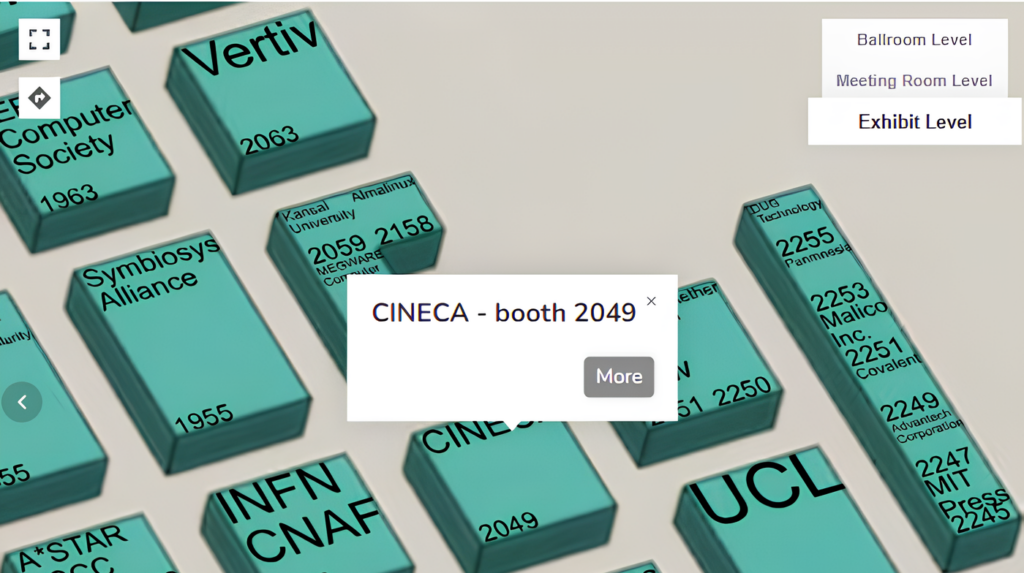Supercomputing 2023

The International Conference on High Performance Computing, Networking, Storage, and Analysis (SC23), the world’s premier event on high-performance computing technologies, is back.
The conference series, which began in 1988 in Orlando, Florida, is celebrating its 35th year.
This year, SC23 will be held in Denver, Colorado, from 12 to 17 November at the Colorado Convention Center.
Once again, Cineca will be present with a stand where it will present the new Leonardo Data Centric / General Purpose module, which makes the machine 100% complete and operational, as well as a review of the projects carried out over the past year and the strategy for the next infrastructure upgrades.
Booth cineca
Cineca colleagues Daniela Galetti, Head of Systems Management, Storage Networks, Gabriella Scipione, Head of Data Management & Analytics, Mirko Cestari, Head of Systems Technology and Architecture, Claudio Domenico Arlandini, Head of HPC POC Solutions, Roberto Gori, Head of FW Interface Development, Fabio Affinito, Head of Specialist Support and R&D, Massimiliano Guarrasi, Head of HPC Production, Daniele Cesarini, Senior HPC Technology Specialist will be present to answer questions and discuss the future of the HPC technology!
The event will also be attended by Sanzio Bassini, Director of the HPC Department.
Programme
Cineca anche quest’anno ha organizzato alcuni workshop, di seguito il programma.
November 12th 2023, 2:55PM-3:20PM MST
Domain-Specific Energy Modeling for Drug Discovery and Magnetohydrodynamics Applications.
“Frequency scaling is a well-known energy-saving power management technique that modulates the device frequency to explore the trade-off between energy and performance. Higher energy savings require a frequency tuning phase since different applications can have different energy and time behavior depending on the frequency setting. Machine learning models can be used to predict the optimal frequency configuration based on static or dynamic features extracted from the target application.
While general-purpose energy models can be very accurate on a wide range of applications their accuracy can be limited by the specific input of the target application. We present an energy characterization that spans the fields of drug discovery and magnetohydrodynamics by using two real-world applications as case studies: LiGen and Cronos. To overcome the limitations of general-purpose approaches, we define two domain-specific energy models, which enhance the general-purpose energy models by leveraging the target application’s input parameter to increase the accuracy.”
November 12th 2023, ore 3:48PM-4:06PM MST
A Systematic Mapping Study of Italian Research on Workflows.
“An entire ecosystem of methodologies and tools revolves around scientific workflow management. They cover crucial non-functional requirements that standard workflow models fail to target, such as interactive execution, energy efficiency, performance portability, Big Data management, and intelligent orchestration in the Computing Continuum. Characterizing and monitoring this ecosystem is crucial to develop an informed view of current and future research directions.
This work conducts a systematic mapping study of the Italian workflow research community, collecting and analyzing 25 tools and 10 applications from several scientific domains in the context of the “National Research Centre for HPC, Big Data, and Quantum Computing” (ICSC). The study aims to outline the main current research directions and determine how they address the critical needs of modern scientific applications. The findings highlight a variegated research ecosystem of tools, with a prominent interest in advanced workflow orchestration and still immature but promising efforts toward energy efficiency.”


